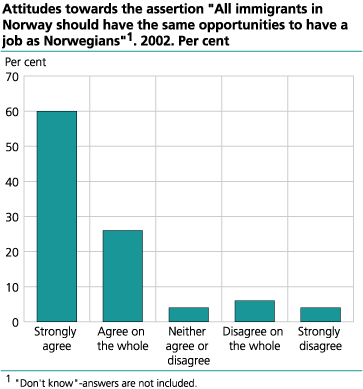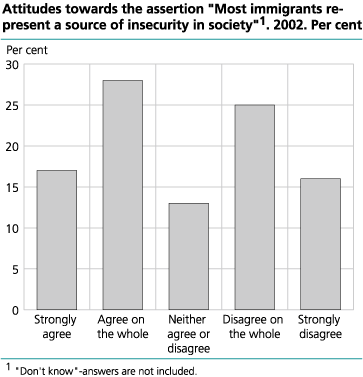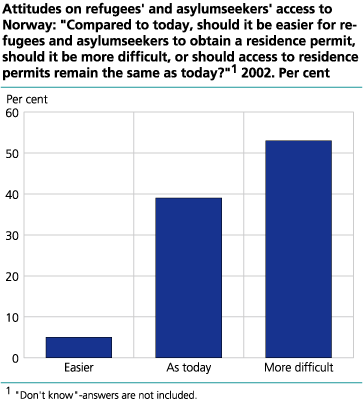Content
Published:
This is an archived release.
Positive towards immigrants' work effort
Two out of three are of the opinion that immigrants make an important contribution to the Norwegian working life. Six out of seven think that immigrants deserve the same opportunities to have a job as Norwegians. More than half think it should be more difficult for immigrants and asylum seekers to obtain residence permits in Norway, and around 40 per cent believe immigrants represent a source of insecurity in society.
Two thirds of the population agree that" Most immigrants make an important contribution in the Norwegian work life ". Two out of ten disagree, and one out of ten is unsure. The vast majority, 85 per cent, agree that " All immigrants in Norway should have the same opportunities for work as Norwegians ". This was the assertion that gathered the most positive approval. Still, an even larger proportion agreed to this two years ago. In the spring of 2000 the support was 91 per cent. The decrease of 6 percentage points is not necessarily an expression of increased reluctance towards immigrants; it may be connected to the current downward business cycle in Norway.
Two thirds argue that " Most immigrants enrich the cultural life in Norway ". This can be compared to a similar question in a survey carried out in the EU in 2000. With some reservations due to slight differences in the wording in questions and answers, and different points of time, we have made some comparisons. Among the EU countries only Sweden and Finland had a larger portion that agreed that " Most immigrants enrich the cultural life " in the country. Among 15 EU countries the average portion that agreed was 50 per cent, against 63 per cent in Norway.
In the Norwegian survey, the largest differences in opinion were found concerning the assertion " Most immigrants abuse the system of social benefits ". Four out of ten agree, and the same proportion disagrees. The conviction that " Most immigrants abuse the system of social benefits " has a weaker position in Norway than in other European countries. Among 13 EU countries only Spain has a larger portion that disagree than Norway. On average in these countries 32 per cent disagree, against 43 per cent in Norway. The Norwegian attitudes in relation to these questions seem to be more "immigrant friendly" than in Central Europe.
45 per cent regard immigrants as a source of insecurity
Among the five assertions the respondents were asked to respond to the assertion that " Most immigrants are a cause of insecurity in society " triggered the most immigrant reluctant answers. While 45 per cent agreed 41 per cent disagreed.
The conviction that "Most immigrants represent a source of insecurity in society" is as widespread in Norway as the average in the EU countries. While the European average was 42 per cent, the corresponding figure for Norway was 45 per cent. Sweden and Finland are again the two countries with the most immigrant friendly attitudes. The proportion that viewed immigrants as a threat to security was far lower there than in Norway. In Denmark as much as six out of ten believed that immigrants represent a source of insecurity. The fact that Norway places itself in "the middle" with regards to this assertion, and not with the two previously mentioned may be particularly connected to the different points of time the two surveys were carried out. The EU survey was carried out during spring 2000, before the terror events in the US on September 11th.2001, while the Norwegian survey was carried out after this event. Responses to this assertion are probably more sensitive to such events than towards the two other assertions.
Majority for a more strict immigration policy
A little more than half, 53 per cent, is of the opinion that it should be more difficult to obtain residence permit in Norway than it is today. This is the question to which the responses were the most negative. Only 5 per cent believe that granting a residence permit should be made easier, while four out of ten believe the system should remain unchanged.
There seems to be a marked change in opinion relation to this question. In the spring 2000 64 per cent believed that "Norway should grant residence to refugees and asylum seekers to at least the same extent as today". Those who believed that "it should be easier for refugees and asylum seekers to obtain a residence permit in Norway" or that "access to residence should be as it is today" now add up to 44 per cent. From this we can assume that the proportion that would like stricter rules for reception of refugees has increased by 20 percentage points. However, some reservations must be taken in relation to the comparison and the exact wording in questions in the two surveys.
The change in opinion may seem more drastic than it really is, as the number of asylum seekers is higher now than it was a few years ago. In 1999 about 10 000 persons applied for asylum, while the number was almost 15 000 in 2001. The experience of "today's situation" will vary, and the perception people have of how many are coming will affect the answers. We have seen that the attitudes at this point vary according to the impression of the flow of asylum seekers at the time in question, and not necessarily in relation to how many who actually are granted stay in the country. A strong media focus on negative immigration related events, and on poor dealing with applications affects the opinions in a negative direction, while a strong focus on refugees in need affects the opinions in a positive direction.
Regarding the question on refugees' access to the country the Norwegian opinion is about the same as the Danish opinion in 2002. Both in Germany and in the United Kingdom the wish to introduce further restrictions is far more widespread than in Norway. In Sweden 44 per cent wish to restrict refugees' access to the country, against Norway's 53 per cent. This even in spite of the fact that Sweden has a higher portion of immigrants and a larger flow of asylum seekers than Norway.
One out of three has no contact with immigrants
Two thirds of the adult population have contact with immigrants, while one out of three has no such contact. Place of work is the most common arena for contact with immigrants. Four out of ten have some kind of contact with immigrants at the place of work. Barely three out of ten have contact with immigrants among friends and acquaintances, two out of ten among neighbours, while only one out of ten has contact among close relatives. In general, young people have more contact than older people, those with high educational attainment more than those with low educational attainment, and people settled in urban areas more than those in rural areas.
Those with more contact are more positive
People that have contact with immigrants have a more positive attitude towards immigrants than those without such contact. We also see a correspondence between the amount of contact (numbers of arenas) and a positive attitude towards immigrants.
One question was suited saying something about personal relations to immigrants. 90 per cent are positive to having an immigrant as home help or neighbour. When it came to having an immigrant as a son- or daughter- in-law 40 per cent were reluctant. However, a little more than half, 53 per cent, may not experience this as a problem.
People with high education are more positive
Factors such as age, level of education, place of residence and political conviction are of importance for our attitudes. Attitudes towards immigrants show little variation according to gender. Older people (67-79 years) are generally less tolerant in relation to immigrants and immigration than young (16-24 years) and young adults (25-44 years). Young adults are in some relations more liberal in their opinions about immigrants and immigration than the youngest, something that is partly related to the fact that more have higher education. High level of educational attainment clearly corresponds to a positive attitude towards immigrants and immigration.
People living in the most central areas generally have a more "immigrant friendly" orientation than those settled in urban areas. Those with a left wing political affiliation (RV, SV and Venstre) are clearly more positive towards immigration and immigrants, while the right wing voters (particularly Fremskrittsparti voters and to some extent Senterparti voters) more often take the opposite stand [corrected 13.01.03]. We have seen that political party affiliation to some degree corresponds to the educational attainment.
These results are based on a new survey on the population in Norway's attitudes towards immigrants and immigration. The questions are a part of Statistics Norway's Omnibus survey.
Tables:
- Table 1 Attitudes towards five assertions on immigrants. 2002. Per cent
- Table 2 Attitudes towards the assertion 'All immigrants in Norway should have the same opportunities to have a job as Norwegians'. 1993-2000 and 2002. Per cent
- Table 3 Attitudes towards the assertion that 'Most immigrants abuse the system of social benefits'. EU countries spring 2000 and Norway fall 2002. Per cent
- Table 4 Attitudes towards the assertion 'Most immigrants enrich the cultural life in (country)'. EU countries spring 2000 and Norway fall 2002. Per cent
- Table 5 Attitudes towards the assertion 'Most immigrants are a cause of unseurity in society'. EU countries spring 2000 and Norway fall 2002. Per cent
- Table 6 Attitudes towards refugees access to the country. 'Then a question on refugees' access to Norway. Compared to how it is now, should there be introduced restrictions, should reliefs be introduced, or should the rules for obtaining residence permits remain unchanged?' 2002. Per cent
- Table 7 Contact with immigrants on different arenas. 2002. Per cent
- Table 8 Answers to three questions on relation to immigrants. 2002. Per cent
Contact
-
Frøydis Strøm
E-mail: froydis.strom@ssb.no
tel.: (+47) 40 81 13 17
-
Christian Sørlien Molstad
E-mail: christian.molstad@ssb.no
tel.: (+47) 46 65 99 12



